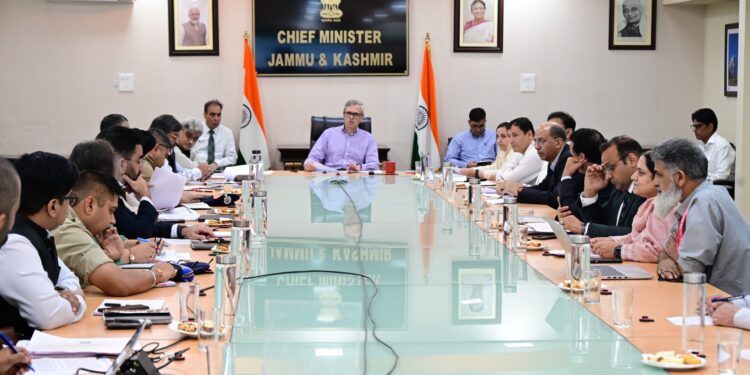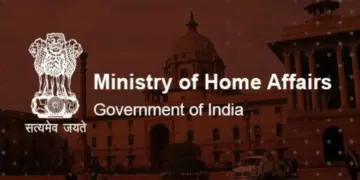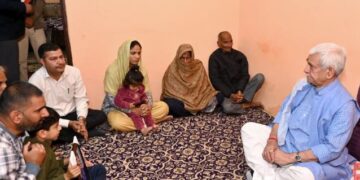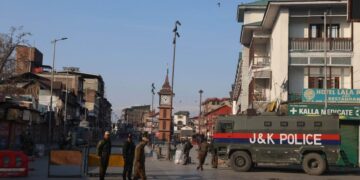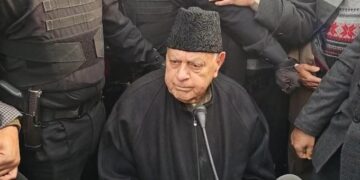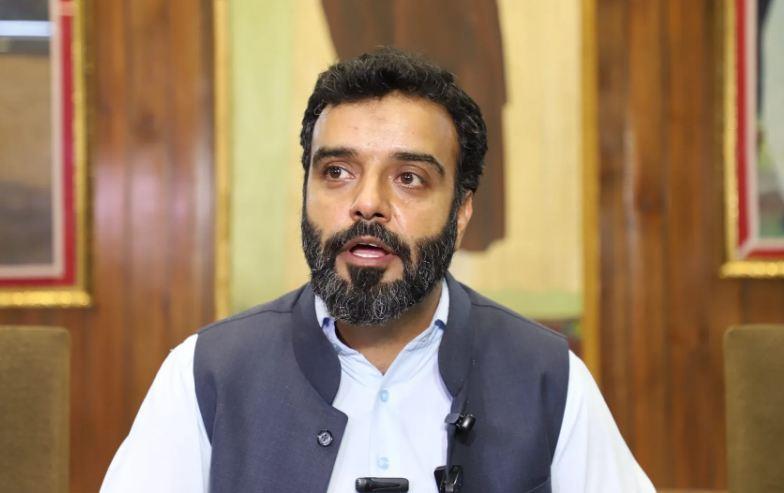SRINAGAR: Amid the rotten meat seizures and public outcry surrounding the issue, the Chief Minister, Omar Abdullah today directed exemplary punitive action against those found storing or selling unsafe food.
The Chief Minister chaired a high-level meeting to review the ongoing food safety enforcement campaign in the wake of recent seizures of unsafe meat and meat products, particularly in the Kashmir Valley, an official statement issued here said.
“The CM directed exemplary punitive action against those found storing or selling unsafe food, emphasising that offenders posing risks to public health must be prosecuted under the relevant provisions of the Food Safety & Standards Act and called for criminal proceedings against the most serious violators,” the statement said.
“The grave problem appears to have remained unchecked and unnoticed for too long. The unscrupulous elements have played with health and lives of people. This has to stop and those deliberately involved in playing with public health must face the law,” the statement quoted CM as saying.
The statement said that CM appreciated officials for launching the drive and exposing the dangerous rot in the food chain, insisting, there can be no compromise on public health and the drive will continue and that there will be an audit of the concerned departments and the mechanism to stop import, sale and use of the unhygienic meat and other food items.
To tighten quality control, the Chief Minister ordered the establishment of entry-point check posts and testing laboratories at Lakhanpur and Qazigund to screen mutton, chicken, and other perishable items entering Jammu & Kashmir. He further directed that Food Testing Laboratories be set up at every district headquarters, instead of limiting such facilities to Jammu and Srinagar, thereby significantly enhancing the Government’s enforcement capacity.
“No meat should be sold and used without proper clearance. The Food Safety and Drugs Organization would be further strengthened to ensure rigorous monitoring and swift action against violations,” the statement quoted CM as saying.
The Chief Minister further instructed intensified inspection drives across all districts, with Deputy Commissioners personally leading surprise market checks to ensure strict compliance with prescribed hygiene and quality standards. All mobile food-testing vans are to be deployed immediately to support these operations.
While acknowledging the justified public and media concern, the CM urged citizens to approach the concerned authorities rather than taking the law into their own hands. He cautioned against vigilante actions and directed the Food Safety Department to follow due procedure, work with the police for surprise raids, and avoid harassment of traders who comply with safety regulations.
The CM also ordered the registration of all food distributors, traders, and vendors, bringing them under a formal licensing framework. An inter-departmental committee will be constituted to ensure coordination, efficiency, and smooth enforcement, particularly for the distribution and sale of safe, hygienic, fresh, and properly labelled perishable items such as meat and chicken.
Departments have been instructed to verify that meat supplies originate from safe sources, that the cold chain is maintained, and that cold stores are equipped with deep-freezing facilities. The CM took serious note of the use of harmful chemicals, unauthorized synthetic additives, and colouring agents, stressing their potential health hazards.
Health experts, including the Director of SKIMS and the Principal of GMC Srinagar, briefed the meeting on the ill-effects of food adulteration and the health risks posed by unsafe food, urging changes in food habits to reduce the rising incidence of chronic illnesses, said the statement
Secretary Health & Medical Education, Dr Abid Rashid Shah presented details of recent enforcement activities, seizures of unsafe meat and poultry, penalties prescribed under law, and the roles of various departments, including Food Safety, Food Civil Supplies & Consumer Affairs, Agriculture, Industries & Commerce, Home, Housing & Urban Development, and District Administration. He also outlined an immediate 30-day action plan involving:
“Mapping all food businesses and vendors; Intensified inspection drives: Public reporting campaigns via “Dial 104”: Community engagement initiatives, and Establishing entry check posts at Lakhanpur and Qazigund.”
“CM reiterated the government’s commitment to take concerted and coordinated action to curb violations in the sale, storage, and distribution of perishable food items—particularly meat, meat-based products, and dairy—ensuring the highest standards of consumer safety and public health and appealed the people to remain vigilant and not to buy any processed meat from unauthorized vendors,” the statement added.
CM Abdullah reviews Srinagar & Jammu Master Plans, Building Bye-Laws
Chief Minister Omar Abdullah today chaired a meeting to review the master plans for the twin cities of Srinagar and Jammu, alongside the Unified Building Bye-Laws (UBBL) for Jammu and Kashmir.
The meeting was attended by Advisor to the Chief Minister Nasir Aslam Wani, Chief Secretary Atal Dulloo, Commissioner Secretary Housing & Urban Development Department (H&UDD) Mandeep Kaur, Divisional Commissioners of Kashmir and Jammu, Deputy Commissioners of Srinagar and Jammu, Commissioners of Srinagar Municipal Corporation and Jammu Municipal Corporation, Vice Chairpersons of Srinagar and Jammu Development Authorities, and other senior officials concerned, an official statement issued here said.
The meeting held detailed deliberations on the Srinagar Master Plan-2035, Jammu Master Plan-2032, and the Unified Building Bye-Laws-2021. Commissioner Secretary H&UDD gave comprehensive presentation on the master plans, highlighting their strategic vision, projected urban growth patterns, infrastructure requirements and policy interventions, said the statement.
It said, the Unified Building Bye-Laws were also discussed, particularly those related to permissible land use for residential, industrial, public and semi-public spaces, as well as other technical provisions aimed at streamlining urban development.
CM emphasised that master plans must be realistic, implementable and reflect ground realities, rather than existing solely as vision documents and directed that the plans should take into consideration views of all stakeholders and it should be environmentally sustainable and capable of addressing future urban challenges while preserving the cultural and ecological identity of both cities.
“These master plans must shape the future growth of our two major cities for decades. It is vital that they are not just visionary, but also practical in execution, ensuring tangible benefits for citizens,” the statement quoted CM as saying, adding, he also directed all concerned departments to incorporate on-ground assessments, public feedback and inter-departmental coordination to ensure the successful implementation of the plans.

